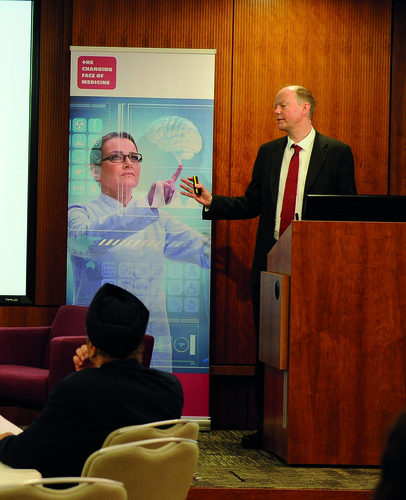Changing Face of Medicine
Human contact will always trump technology
As demands on the healthcare service increase, can we rely on artificial intelligence, genomics and technology to improve what we have? Will the doctors we see today even exist in the future?
Professor Pali Hungin, who heads up the Changing Face of Medicine (CFM) project, believes doctors have a vital role to play. “Medicine, society and technology are evolving fast. We appear to be at a turning point and it’s clear that the prevailing paradigms of medical training, professional practice and relationships with patients need to evolve too; however, in my opinion human contact will always trump technology.”
His view was shared at the Changing Face of Medicine conference in London on 27th February. The conference was attended by almost 100 health care professionals including Chief Medical Officer, Chris Whitty, with the aim of developing a vision of how clinicians and medical practice might evolve in the next 20 years.
“As leaders in the field we must demonstrate to our colleagues that we’re thinking not only about the problems that exist now but also how medicine and the environment might develop further and how things might look in the future,” says Hungin.
Michael Farthing, Honorary Professor of Medicine at UCL, supported Professor Hungin’s view, arguing that technology may have more to do with enhancing the quality of care than substituting for clinicians. While Professor Jocelyn Cornwell, Founder of the Point of Care Foundation, proposed a greater focus on trust, highlighting the fact that currently, patients have little say in how they receive care and limited access to their medical records.
The therapeutic power of face-to-face relationships was again emphasised by Dr Patricia Wilkie, President of the National Association for Patient Participation who insisted that every patient should be treated as a person not a case.
Sir Mark Caulfield, Chief Scientist for Genomics, went beyond this with a utopian vision of disease diagnosis and treatment through DNA. Such technological leaps forward will inevitably have major implications for the training and clinical roles of doctors, as well as the ways in which they interact with patients, although just how, is not yet clear…
England’s chief Medical Officer, Chris Whitty, spoke about the pressures of an ageing population and the challenge of multimorbidity. “There will be a steady increase in the concentration of multimorbidity in people at the oldest end of the age spectrum, along with changing patterns of multimorbidity involving cancer, cardiovascular disease and dementia, clustering of co-morbidities, and changes in disease geography. These all have implications for the distribution and skill mix required of the medical workforce.
“Looking to the future we will need to tackle multimorbidity more seriously, look much harder at case-mix and changes in the geographical distribution of disease, encourage different working patterns to respond to these, and become more serious about understanding and modifying demand. We will need to train people closer to where we need them to work and understand much better the reasons for doctors choosing to go into certain specialties and not others. Careers will need to be more flexible so that doctors are able to do different things at different times.”
What emerged from the discussions at the Changing Face of Medicine conference was the value placed on genuinely personal care and the need for kindness.
Professor Hungin said, “Placing ourselves into the future is not easy. We can see where we are at the moment, recognise our current difficulties and problems and indicate how things need to change but visualizing a picture 20 years hence is challenging. So many variables apply so perhaps the only thing we can be sure of is the need for a kinder and more empathetic approach, not just to patients but also towards our colleagues.”
Editor’s Notes
The Changing Face of Medicine conference was set up 18 months ago and is a collaboration hosted by the Academy of Medical Royal Colleges. The project was funded by an unrestricted research grant from the Wesleyan Foundation and some initial monies from the British Medical Association. Its purpose is to catalyse a discussion about the future of medicine to help prepare for what is in the pipeline, hopefully providing an antidote to some of the present difficulties in the way medicine and health are delivered.
Pali Hungin, Emeritus Professor in the Faculty of Medical Sciences at Newcastle University, was formerly the Dean of Medicine at Durham University. As the President of the BMA in 2017 he initiated work which led to the formation of the Changing Face of Medicine project, bringing together an international faculty of clinicians and lay people to consider the present strains in medicine and to invite projections about the future. As well as a GP in NE England for he worked in secondary care gastroenterology and much of his research is based on achieving earlier diagnoses and understanding barriers to good care.
The Changing Face of Medicine
For further information please contact: Satellite PR:
+44 (0)20 3872 4903
pauline@satellitepr.com
This press release was distributed by ResponseSource Press Release Wire on behalf of Satellite-Health Ltd in the following categories: Health, Education & Human Resources, Medical & Pharmaceutical, for more information visit https://pressreleasewire.responsesource.com/about.
